Essay on Personal Experience of Gender Roles and Upbringing
VerifiedAdded on 2022/09/13
|6
|1449
|15
Essay
AI Summary
This essay examines the author's personal experiences and how their upbringing, particularly within a Canadian middle-class family, shaped their understanding of gender roles. The essay details the influence of the author's parents, with the father as the breadwinner and the mother as the homemaker, leading to early perceptions of gender-based expectations. The author discusses how societal influences, including media and peers, reinforced these stereotypes, impacting their emotional expression and interests during childhood and adolescence. The essay references research on gender stereotyping, highlighting its potential negative impacts on children's development and mental health, and concludes with a call for parents to encourage children to make their own decisions to foster a better future. The essay also quotes from Katha Pollitt's "Why Boys Don't Play with Dolls" and other sources to support its arguments.

Running head: ENGLISH
English
Name of the Student
Name of the University
English
Name of the Student
Name of the University
Paraphrase This Document
Need a fresh take? Get an instant paraphrase of this document with our AI Paraphraser
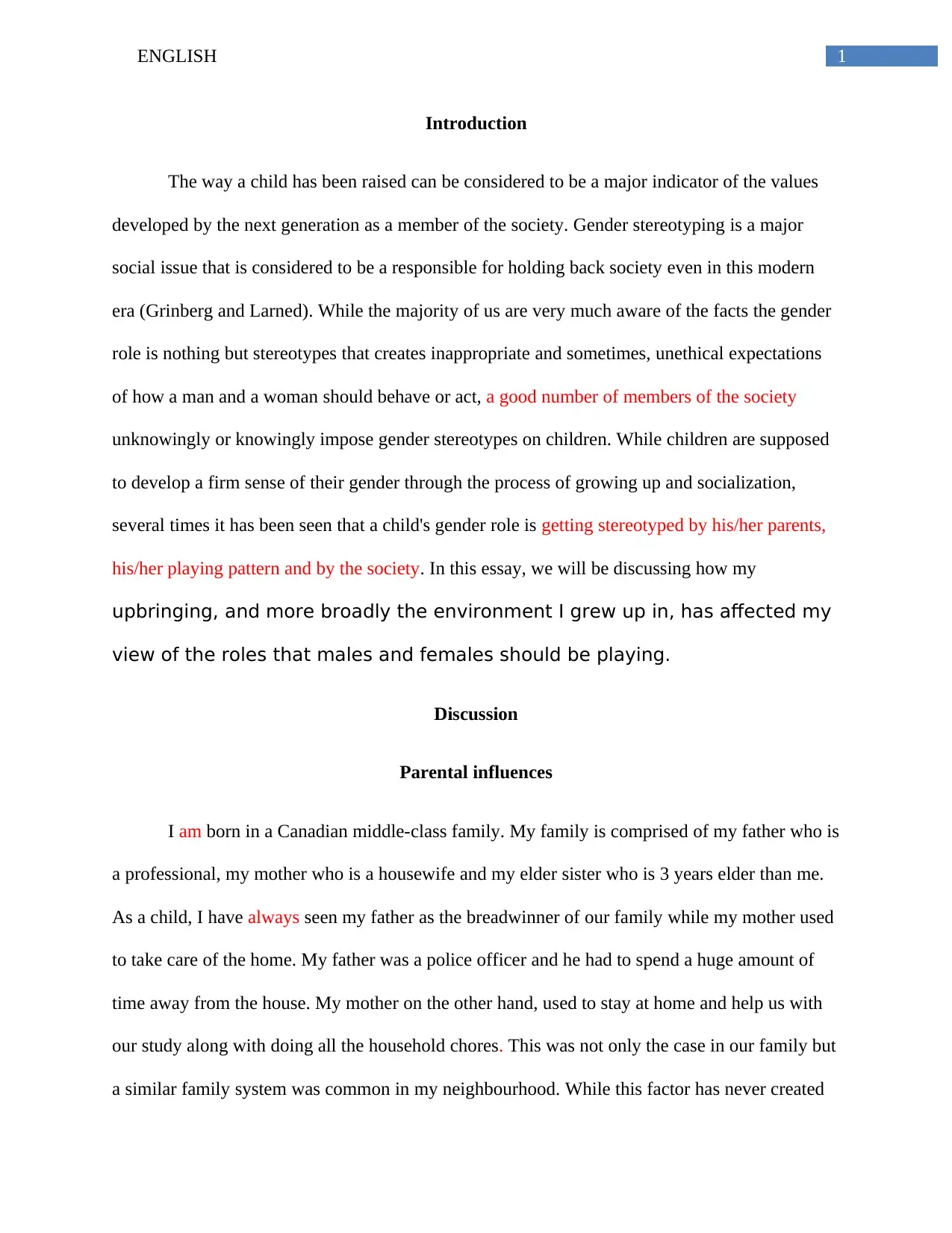
1ENGLISH
Introduction
The way a child has been raised can be considered to be a major indicator of the values
developed by the next generation as a member of the society. Gender stereotyping is a major
social issue that is considered to be a responsible for holding back society even in this modern
era (Grinberg and Larned). While the majority of us are very much aware of the facts the gender
role is nothing but stereotypes that creates inappropriate and sometimes, unethical expectations
of how a man and a woman should behave or act, a good number of members of the society
unknowingly or knowingly impose gender stereotypes on children. While children are supposed
to develop a firm sense of their gender through the process of growing up and socialization,
several times it has been seen that a child's gender role is getting stereotyped by his/her parents,
his/her playing pattern and by the society. In this essay, we will be discussing how my
upbringing, and more broadly the environment I grew up in, has affected my
view of the roles that males and females should be playing.
Discussion
Parental influences
I am born in a Canadian middle-class family. My family is comprised of my father who is
a professional, my mother who is a housewife and my elder sister who is 3 years elder than me.
As a child, I have always seen my father as the breadwinner of our family while my mother used
to take care of the home. My father was a police officer and he had to spend a huge amount of
time away from the house. My mother on the other hand, used to stay at home and help us with
our study along with doing all the household chores. This was not only the case in our family but
a similar family system was common in my neighbourhood. While this factor has never created
Introduction
The way a child has been raised can be considered to be a major indicator of the values
developed by the next generation as a member of the society. Gender stereotyping is a major
social issue that is considered to be a responsible for holding back society even in this modern
era (Grinberg and Larned). While the majority of us are very much aware of the facts the gender
role is nothing but stereotypes that creates inappropriate and sometimes, unethical expectations
of how a man and a woman should behave or act, a good number of members of the society
unknowingly or knowingly impose gender stereotypes on children. While children are supposed
to develop a firm sense of their gender through the process of growing up and socialization,
several times it has been seen that a child's gender role is getting stereotyped by his/her parents,
his/her playing pattern and by the society. In this essay, we will be discussing how my
upbringing, and more broadly the environment I grew up in, has affected my
view of the roles that males and females should be playing.
Discussion
Parental influences
I am born in a Canadian middle-class family. My family is comprised of my father who is
a professional, my mother who is a housewife and my elder sister who is 3 years elder than me.
As a child, I have always seen my father as the breadwinner of our family while my mother used
to take care of the home. My father was a police officer and he had to spend a huge amount of
time away from the house. My mother on the other hand, used to stay at home and help us with
our study along with doing all the household chores. This was not only the case in our family but
a similar family system was common in my neighbourhood. While this factor has never created
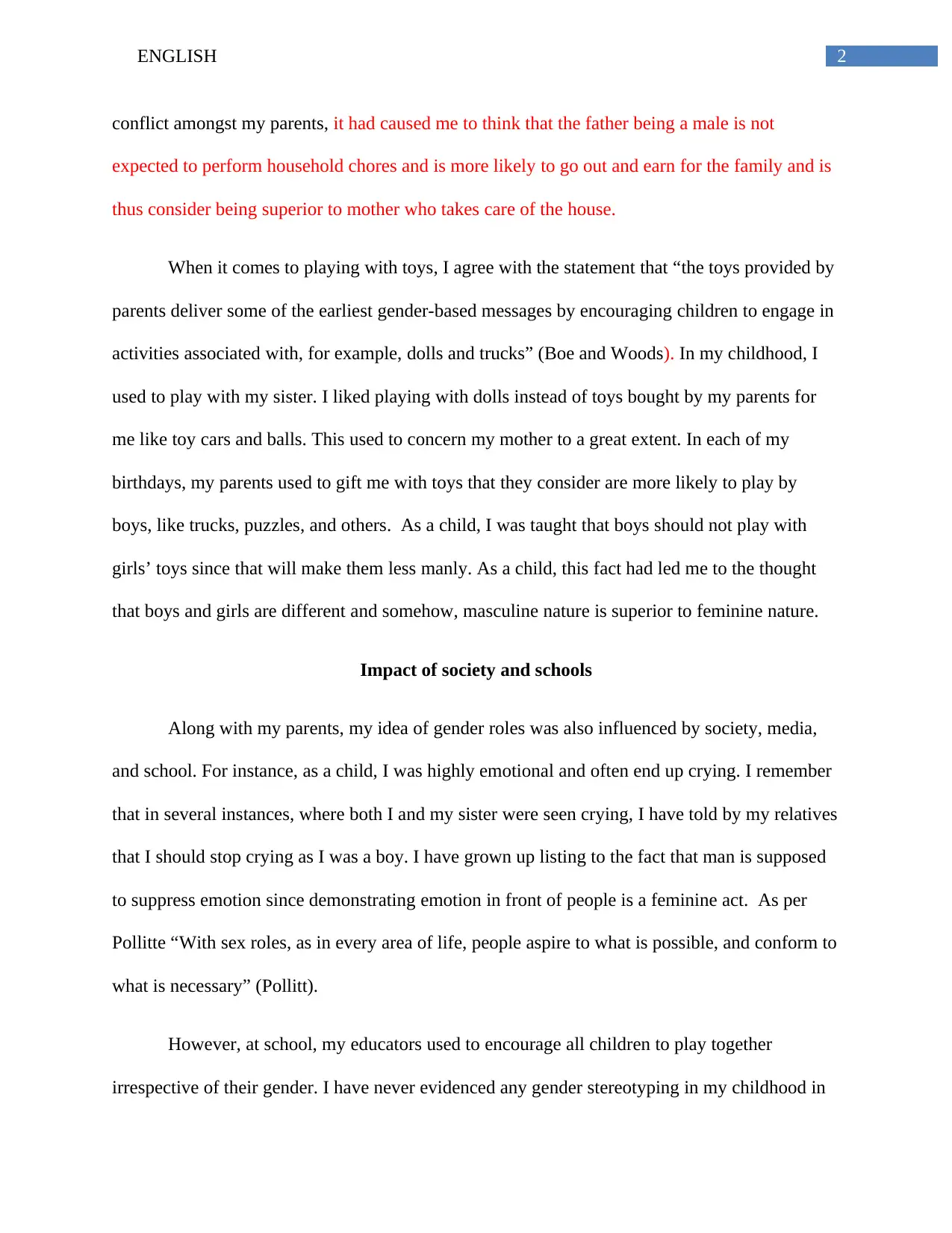
2ENGLISH
conflict amongst my parents, it had caused me to think that the father being a male is not
expected to perform household chores and is more likely to go out and earn for the family and is
thus consider being superior to mother who takes care of the house.
When it comes to playing with toys, I agree with the statement that “the toys provided by
parents deliver some of the earliest gender-based messages by encouraging children to engage in
activities associated with, for example, dolls and trucks” (Boe and Woods). In my childhood, I
used to play with my sister. I liked playing with dolls instead of toys bought by my parents for
me like toy cars and balls. This used to concern my mother to a great extent. In each of my
birthdays, my parents used to gift me with toys that they consider are more likely to play by
boys, like trucks, puzzles, and others. As a child, I was taught that boys should not play with
girls’ toys since that will make them less manly. As a child, this fact had led me to the thought
that boys and girls are different and somehow, masculine nature is superior to feminine nature.
Impact of society and schools
Along with my parents, my idea of gender roles was also influenced by society, media,
and school. For instance, as a child, I was highly emotional and often end up crying. I remember
that in several instances, where both I and my sister were seen crying, I have told by my relatives
that I should stop crying as I was a boy. I have grown up listing to the fact that man is supposed
to suppress emotion since demonstrating emotion in front of people is a feminine act. As per
Pollitte “With sex roles, as in every area of life, people aspire to what is possible, and conform to
what is necessary” (Pollitt).
However, at school, my educators used to encourage all children to play together
irrespective of their gender. I have never evidenced any gender stereotyping in my childhood in
conflict amongst my parents, it had caused me to think that the father being a male is not
expected to perform household chores and is more likely to go out and earn for the family and is
thus consider being superior to mother who takes care of the house.
When it comes to playing with toys, I agree with the statement that “the toys provided by
parents deliver some of the earliest gender-based messages by encouraging children to engage in
activities associated with, for example, dolls and trucks” (Boe and Woods). In my childhood, I
used to play with my sister. I liked playing with dolls instead of toys bought by my parents for
me like toy cars and balls. This used to concern my mother to a great extent. In each of my
birthdays, my parents used to gift me with toys that they consider are more likely to play by
boys, like trucks, puzzles, and others. As a child, I was taught that boys should not play with
girls’ toys since that will make them less manly. As a child, this fact had led me to the thought
that boys and girls are different and somehow, masculine nature is superior to feminine nature.
Impact of society and schools
Along with my parents, my idea of gender roles was also influenced by society, media,
and school. For instance, as a child, I was highly emotional and often end up crying. I remember
that in several instances, where both I and my sister were seen crying, I have told by my relatives
that I should stop crying as I was a boy. I have grown up listing to the fact that man is supposed
to suppress emotion since demonstrating emotion in front of people is a feminine act. As per
Pollitte “With sex roles, as in every area of life, people aspire to what is possible, and conform to
what is necessary” (Pollitt).
However, at school, my educators used to encourage all children to play together
irrespective of their gender. I have never evidenced any gender stereotyping in my childhood in
⊘ This is a preview!⊘
Do you want full access?
Subscribe today to unlock all pages.

Trusted by 1+ million students worldwide
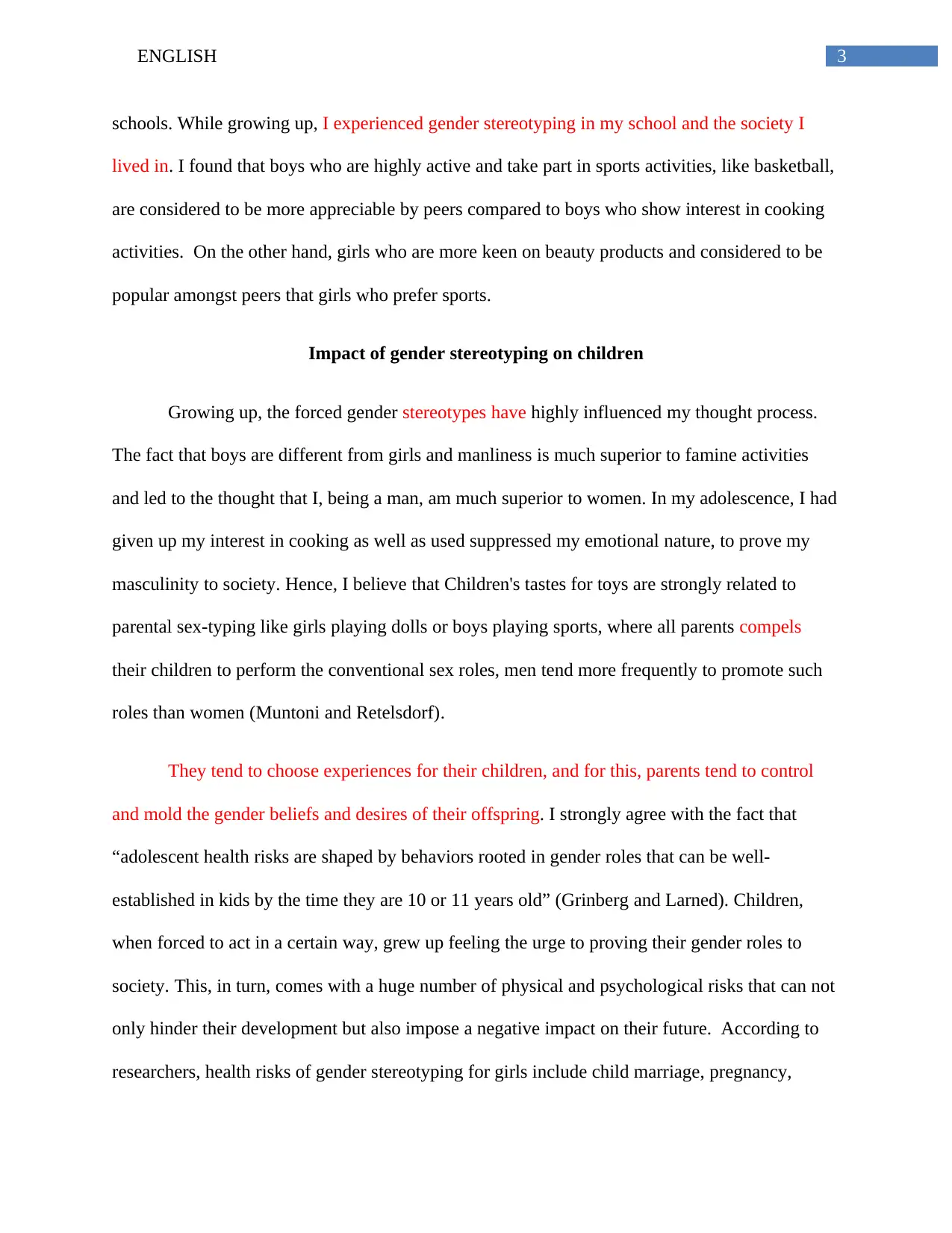
3ENGLISH
schools. While growing up, I experienced gender stereotyping in my school and the society I
lived in. I found that boys who are highly active and take part in sports activities, like basketball,
are considered to be more appreciable by peers compared to boys who show interest in cooking
activities. On the other hand, girls who are more keen on beauty products and considered to be
popular amongst peers that girls who prefer sports.
Impact of gender stereotyping on children
Growing up, the forced gender stereotypes have highly influenced my thought process.
The fact that boys are different from girls and manliness is much superior to famine activities
and led to the thought that I, being a man, am much superior to women. In my adolescence, I had
given up my interest in cooking as well as used suppressed my emotional nature, to prove my
masculinity to society. Hence, I believe that Children's tastes for toys are strongly related to
parental sex-typing like girls playing dolls or boys playing sports, where all parents compels
their children to perform the conventional sex roles, men tend more frequently to promote such
roles than women (Muntoni and Retelsdorf).
They tend to choose experiences for their children, and for this, parents tend to control
and mold the gender beliefs and desires of their offspring. I strongly agree with the fact that
“adolescent health risks are shaped by behaviors rooted in gender roles that can be well-
established in kids by the time they are 10 or 11 years old” (Grinberg and Larned). Children,
when forced to act in a certain way, grew up feeling the urge to proving their gender roles to
society. This, in turn, comes with a huge number of physical and psychological risks that can not
only hinder their development but also impose a negative impact on their future. According to
researchers, health risks of gender stereotyping for girls include child marriage, pregnancy,
schools. While growing up, I experienced gender stereotyping in my school and the society I
lived in. I found that boys who are highly active and take part in sports activities, like basketball,
are considered to be more appreciable by peers compared to boys who show interest in cooking
activities. On the other hand, girls who are more keen on beauty products and considered to be
popular amongst peers that girls who prefer sports.
Impact of gender stereotyping on children
Growing up, the forced gender stereotypes have highly influenced my thought process.
The fact that boys are different from girls and manliness is much superior to famine activities
and led to the thought that I, being a man, am much superior to women. In my adolescence, I had
given up my interest in cooking as well as used suppressed my emotional nature, to prove my
masculinity to society. Hence, I believe that Children's tastes for toys are strongly related to
parental sex-typing like girls playing dolls or boys playing sports, where all parents compels
their children to perform the conventional sex roles, men tend more frequently to promote such
roles than women (Muntoni and Retelsdorf).
They tend to choose experiences for their children, and for this, parents tend to control
and mold the gender beliefs and desires of their offspring. I strongly agree with the fact that
“adolescent health risks are shaped by behaviors rooted in gender roles that can be well-
established in kids by the time they are 10 or 11 years old” (Grinberg and Larned). Children,
when forced to act in a certain way, grew up feeling the urge to proving their gender roles to
society. This, in turn, comes with a huge number of physical and psychological risks that can not
only hinder their development but also impose a negative impact on their future. According to
researchers, health risks of gender stereotyping for girls include child marriage, pregnancy,
Paraphrase This Document
Need a fresh take? Get an instant paraphrase of this document with our AI Paraphraser
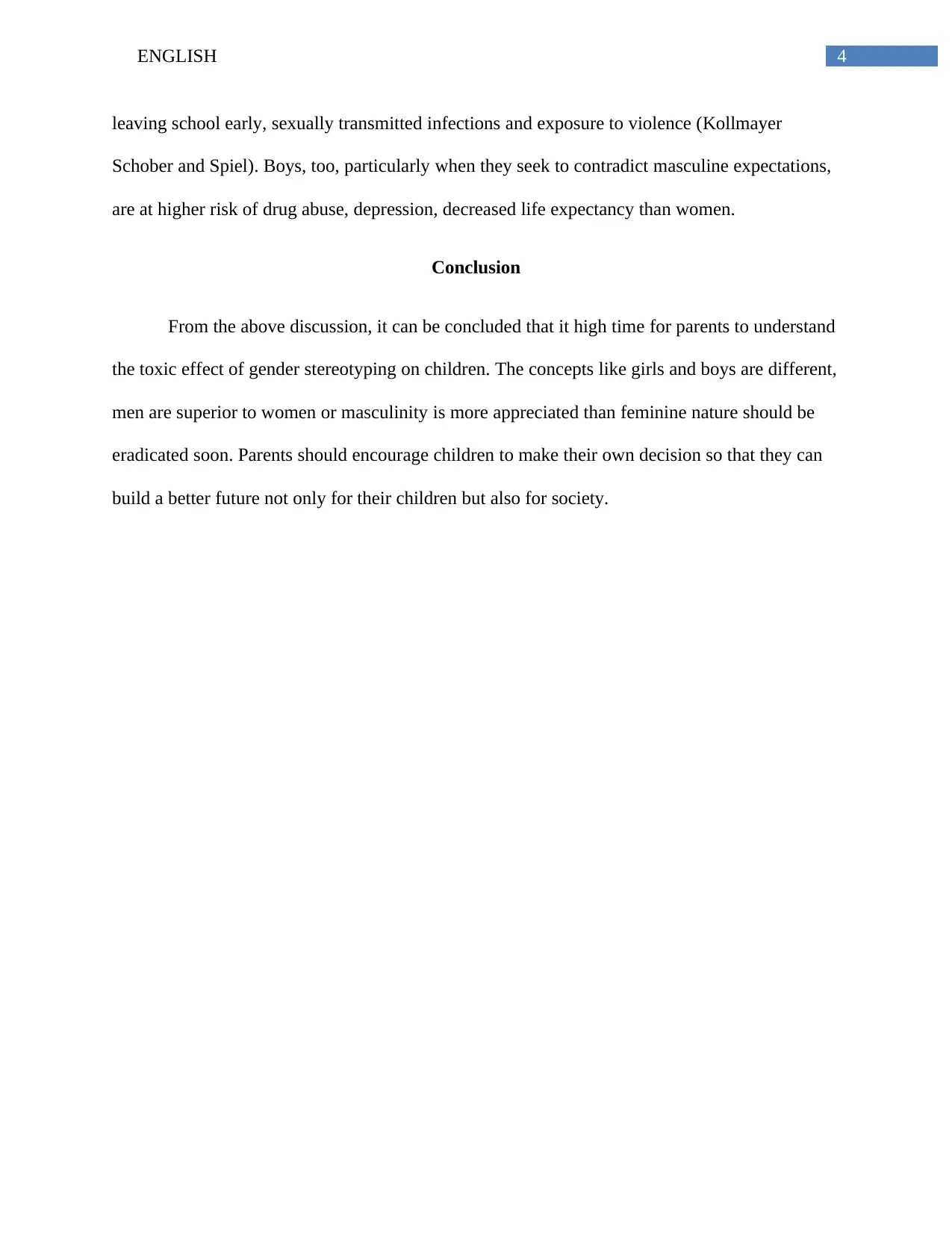
4ENGLISH
leaving school early, sexually transmitted infections and exposure to violence (Kollmayer
Schober and Spiel). Boys, too, particularly when they seek to contradict masculine expectations,
are at higher risk of drug abuse, depression, decreased life expectancy than women.
Conclusion
From the above discussion, it can be concluded that it high time for parents to understand
the toxic effect of gender stereotyping on children. The concepts like girls and boys are different,
men are superior to women or masculinity is more appreciated than feminine nature should be
eradicated soon. Parents should encourage children to make their own decision so that they can
build a better future not only for their children but also for society.
leaving school early, sexually transmitted infections and exposure to violence (Kollmayer
Schober and Spiel). Boys, too, particularly when they seek to contradict masculine expectations,
are at higher risk of drug abuse, depression, decreased life expectancy than women.
Conclusion
From the above discussion, it can be concluded that it high time for parents to understand
the toxic effect of gender stereotyping on children. The concepts like girls and boys are different,
men are superior to women or masculinity is more appreciated than feminine nature should be
eradicated soon. Parents should encourage children to make their own decision so that they can
build a better future not only for their children but also for society.
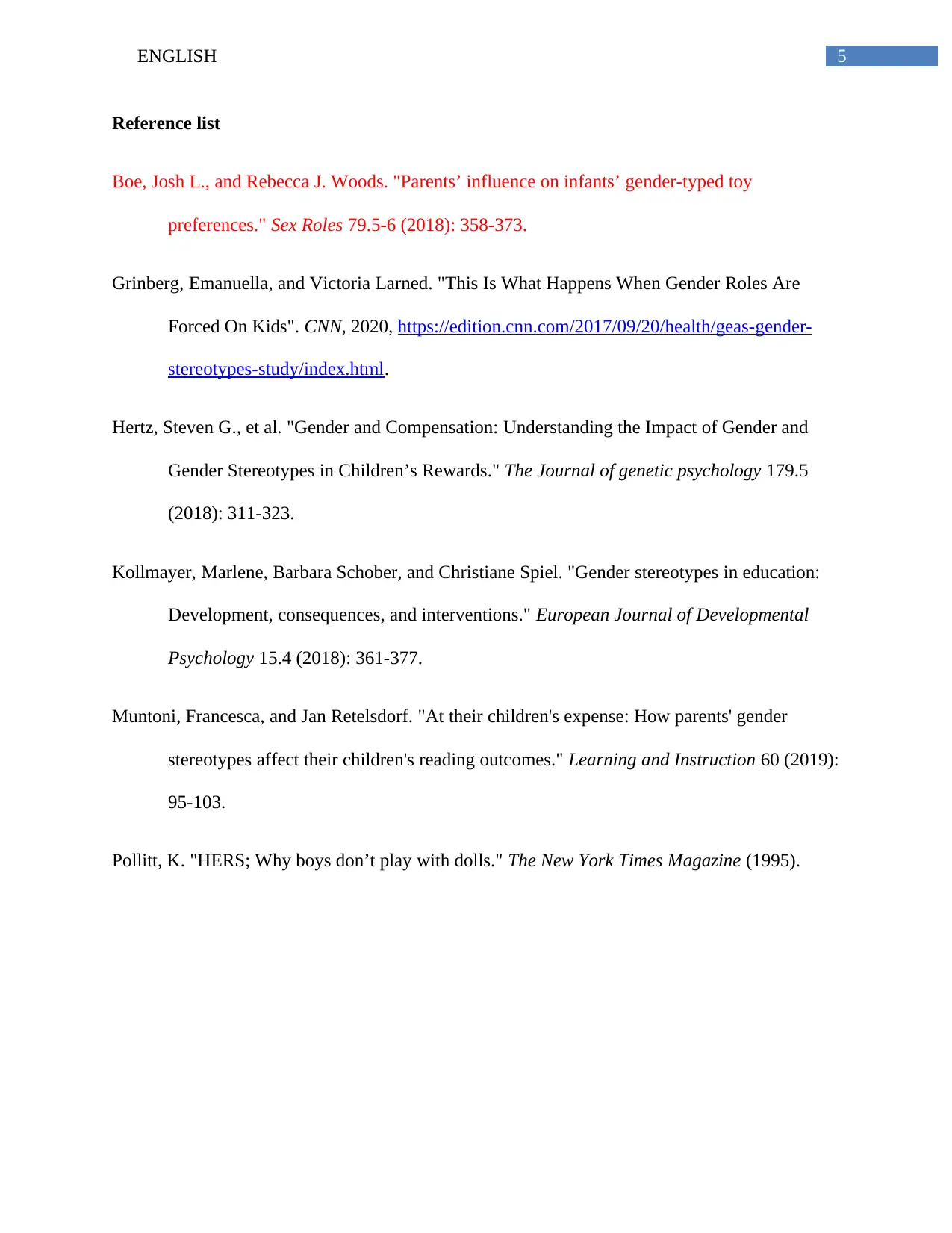
5ENGLISH
Reference list
Boe, Josh L., and Rebecca J. Woods. "Parents’ influence on infants’ gender-typed toy
preferences." Sex Roles 79.5-6 (2018): 358-373.
Grinberg, Emanuella, and Victoria Larned. "This Is What Happens When Gender Roles Are
Forced On Kids". CNN, 2020, https://edition.cnn.com/2017/09/20/health/geas-gender-
stereotypes-study/index.html.
Hertz, Steven G., et al. "Gender and Compensation: Understanding the Impact of Gender and
Gender Stereotypes in Children’s Rewards." The Journal of genetic psychology 179.5
(2018): 311-323.
Kollmayer, Marlene, Barbara Schober, and Christiane Spiel. "Gender stereotypes in education:
Development, consequences, and interventions." European Journal of Developmental
Psychology 15.4 (2018): 361-377.
Muntoni, Francesca, and Jan Retelsdorf. "At their children's expense: How parents' gender
stereotypes affect their children's reading outcomes." Learning and Instruction 60 (2019):
95-103.
Pollitt, K. "HERS; Why boys don’t play with dolls." The New York Times Magazine (1995).
Reference list
Boe, Josh L., and Rebecca J. Woods. "Parents’ influence on infants’ gender-typed toy
preferences." Sex Roles 79.5-6 (2018): 358-373.
Grinberg, Emanuella, and Victoria Larned. "This Is What Happens When Gender Roles Are
Forced On Kids". CNN, 2020, https://edition.cnn.com/2017/09/20/health/geas-gender-
stereotypes-study/index.html.
Hertz, Steven G., et al. "Gender and Compensation: Understanding the Impact of Gender and
Gender Stereotypes in Children’s Rewards." The Journal of genetic psychology 179.5
(2018): 311-323.
Kollmayer, Marlene, Barbara Schober, and Christiane Spiel. "Gender stereotypes in education:
Development, consequences, and interventions." European Journal of Developmental
Psychology 15.4 (2018): 361-377.
Muntoni, Francesca, and Jan Retelsdorf. "At their children's expense: How parents' gender
stereotypes affect their children's reading outcomes." Learning and Instruction 60 (2019):
95-103.
Pollitt, K. "HERS; Why boys don’t play with dolls." The New York Times Magazine (1995).
⊘ This is a preview!⊘
Do you want full access?
Subscribe today to unlock all pages.

Trusted by 1+ million students worldwide
1 out of 6
Related Documents
Your All-in-One AI-Powered Toolkit for Academic Success.
+13062052269
info@desklib.com
Available 24*7 on WhatsApp / Email
![[object Object]](/_next/static/media/star-bottom.7253800d.svg)
Unlock your academic potential
Copyright © 2020–2026 A2Z Services. All Rights Reserved. Developed and managed by ZUCOL.





